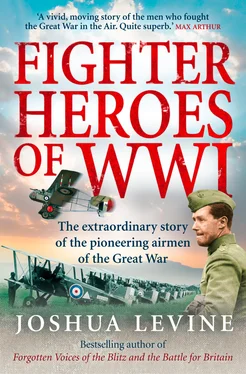We used to go to Brighton and fly along the seafront and very often below the level of the pier. Then we’d zoom up over the West Pier, down again, zoom up over the Palace Pier and down again. We’d swing round and fly inland looking as if we were going to fly in the windows of the hotels then we’d zoom up over the roofs. That gave us great amusement but the people of Brighton didn’t like it very much.
As the war progressed, pilots began to learn to fly at night. Archibald Yuille recalls the difficulties:
It’s very funny, night flying. You get a good horizon to fly against and you can see water clearly underneath you but of course you can’t pick out roads or railway lines. The main thing is to keep your eye on the horizon and not find yourself getting into a dive when you don’t mean to. You had no aids – you were up there all by yourself in the dark for two hours. Not everybody has the mentality to do that. One of the things one did was sing – quite unconsciously. You’d come down absolutely hoarse.
Once a pilot had received his training, he was assigned to a squadron on active service. He was immediately confronted by his greatest challenge. He had to adapt to the reality of aerial warfare – and he had to adapt quickly. Some pilots were simply inept and no amount of training could make a difference. Harold Wyllie, an observer with 6 Squadron, was enraged by such a man in April 1915. His diary records:
Clarke was dreadfully smashed here today. Ross Hume was pilot and somehow managed to side slip and nose dive to the ground. This is wrong. Ross Hume stalled his machine turning. He was a rotten pilot and should never have been allowed to carry a passenger. Clarke died at 11.50 pm without regaining consciousness, thank God. He was one of the best fellows that ever lived and a valuable life has been thrown away by sheer bad flying.
By 1916, so many pilots were being lost that their replacements were barely trained when they arrived at the front. Cecil Lewis, arriving at 3 Squadron, was one of these replacements:
When I got to France, I only had about twenty hours flying and I was posted to a BE2c squadron down on the Somme. The CO took one look at my logbook and said, ‘My God, it’s murder sending you chaps out with nothing on the logbook. You’d better put in a bit of time!’ So he gave me an aircraft and I walloped off to have a look at the lines, to get used to the French maps, all the things that were different. One had always heard, ‘Behind the lines, this side of the lines, the lines, the lines, the lines …’ But I hadn’t a clue as to what the lines looked like – really from the air – looked like …
John Boon was aware of the fate that awaited many of these schoolboys, like Lewis, who arrived to do a man’s job:
We used to see the young men coming in to the orderly office to receive their instructions as to where they had to go. Then the tenders from the squadrons came to the headquarters to pick up them up. You used to see these young fellows with their brand-new wings, brand-new uniform, brand-new Sam Browne belt. Everything was new and smart. Some of these boys didn’t last twenty-four hours.
On joining the Royal Flying Corps or Royal Naval Air Service, the men of the rank and file were treated very differently from the officers. These were the men – the riggers and fitters and other technicians – who would be responsible for keeping the aeroplanes flying. They joined as tradesmen, but they were trained as raw recruits. William Berry made an inauspicious start:
At my very first parade, the man next to me stood there with his boots all dusty. The sergeant said, ‘Man left and right of him, escort him to the guardroom!’ When we got him there, they made him turn out his pockets and I’ve never seen anything like it. He had nails sticking into bits of toffee, stubs of pencils – it was so funny that I burst out laughing. The corporal in charge of the guard looked at me and said, ‘Laughing on escort – worse crime than the prisoner’s! Get in there along with him!’ So by ten past two on my first day, I was confined to barracks.
The discipline meted out to the recruits was of a traditional military variety. Cecil King:
If we were such a superior corps we had to show it in discipline, especially when walking out. We were expected to set an example to everyone. That’s why all our instructors came from the Brigade of Guards. Our discipline had to be second to none.
George Eddington remembers how the discipline was imposed:
What struck me most was the absolute domination of the routine. From your feeding, to your sport, it was all routine. You were made to realize that you were there to do as you were told and not to ask questions. Even a simple thing like turning right or left had to be done just so. Squads were formed in fours, which meant a complicated movement of the feet. The food was not too good at all. You were only allowed out of camp with a pass and you were allowed once a week, until eleven o’clock. You were made to feel that you were nobody at all. You were a soldier first and last. The instructors were, without exception, warrant officers, Guardsmen. They felt that a new-fangled thing like the Flying Corps was a lot of poppycock, and a waste of good men, and they didn’t forget to let us know. We weren’t made to feel that we were technicians. We were soldiers in the King’s army: ‘You are not a superior breed! Get rid of that idea as quick as you like!’
William Berry had a favourite NCO:
I remember Corporal Newbolt. He could have been acting unpaid for all I know. He was six foot odd of brute strength and he would come and put his face by your cheek, within two or three inches – and he would yell at you, ‘Do you know Mrs Newbolt?’ ‘No, Corporal.’ ‘Well, you’ll jolly well know her son!’ He didn’t say ‘jolly’…
Cecil King discovered that the smallest act could breach army regulations:
I remember walking through Aldershot and it came on to rain. I was wearing an overcoat, and I turned the collar up. All of a sudden, I heard a man shouting behind me, ‘That man!’ and I looked round. It was a military policeman on a horse and he said, ‘Do you know you’re improperly dressed?’ I said, ‘No.’ He said, ‘How long have you been in the service?’ ‘Two months.’ ‘Well,’ he said, ‘you’ve turned your collar up without orders. You’ll put it down in the proper manner.’ I didn’t argue the point. I turned it down. But it made me wonder why we had to have an order to be permitted to stay dry.
For some of the men the discipline proved unbearable. Edgar Wooley remembers an uprising in the ranks:
Amongst ourselves we decided we just could not stand the methods our military tutors were adopting. They were acting as a brake on our ability to do our technical training. They were preventing us from making progress as wireless operators. So we rebelled. We refused to carry on our technical training whilst the military training and discipline were so exacting. Word soon got round to those higher up and officers came along to find out what the trouble was. These officers picked out six men of our section – the assumed ringleaders. They were sent to Headquarters at Farnborough and sentenced to twenty-eight days’ confinement. During their confinement, they were visited by a military parson who, on questioning one of them, was surprised by his intelligence and his desire to be a good soldier and a good wireless operator. The parson asked him why he was there. The soldier told him of the recruits’ dissatisfaction at the treatment they had received at the hands of their military trainers. As a result of this discussion, the parson made a report to certain officers and the matter was brought up in Parliament – why was the Royal Flying Corps attempting to institute Prussian military methods into the British army?
Читать дальше












